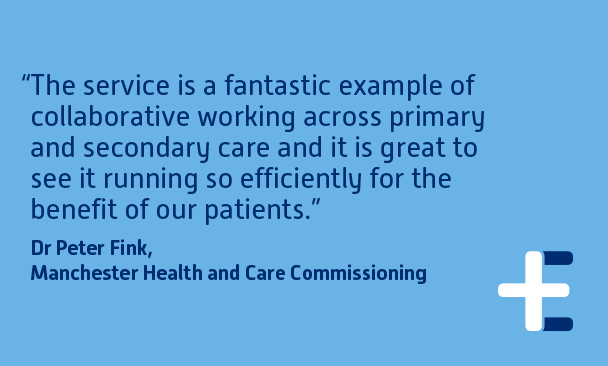New Covid-19 Urgent Eyecare Service Treats Thousands of Patients Across Greater Manchester
16 December 2020
Service benefits patients by delivering care closer to home.

The Covid-19 Urgent Eyecare Service (CUES) was launched in Greater Manchester in May 2020, commissioned via optometry federation Primary Eyecare Services. The service provides patients with access to urgent eye care without needing to go to hospital; patients who would normally seek urgent eye treatment at Manchester Royal Eye Hospital’s emergency department can now contact their local optical practice instead.
CUES is delivered by primary care optometrists and minimises face-to-face appointments by utilising online and remote technology. Many optometrists in the community have the expertise and equipment to assess and diagnose eye conditions, including prescribing qualifications to provide medication. Remote support is provided by hospital ophthalmology teams through a new information sharing platform, Opera.
Both Manchester Health and Care Commissioning and Trafford Clinical Commissioning Group commissioned CUES, making the service available across Greater Manchester. Thousands of residents have benefitted from the service to date, with 87% of patients treated and discharged by local optometrists and just 13% of patients referred for further hospital treatment.
Mr Felipe Dhawahir-Scala, Consultant Ophthalmologist, Vitreoretinal Surgeon and Clinical Lead for the Emergency Eye Department at Manchester Royal Eye Hospital said; “We know we have a hugely talented and capable workforce in primary care optometrists, many of whom have undertaken additional training and have all the equipment needed to assess, diagnose and in many cases treat patients. The implementation of CUES has been brilliant. Optometrists are seeing patients, managing them when they can and seeking additional support when needed.
“The best part is the secure information sharing platform so we can see any images or scans taken, this allows true informed decision making. This means that we can reduce the number of patients in our emergency department, which is more important than ever, so only those with problems needing hospital care are there.
“CUES is a great example of providing more efficient care closer to home by minimising delays and reducing the need for hospital visits. Anyone who is experiencing eye related issues and in need of urgent optometry care should not delay in seeking advice and treatment.”
Rebecca Rietdyke local optometrist in Manchester and Trafford and Clinical Lead for Primary Eyecare Services said: “Optical practices in Manchester and Trafford have risen to the challenge to deliver the CUES service and work closely with hospital colleagues. It’s been great to be able to provide urgent eyecare from my own practice during the pandemic, knowing this has relieved pressure on the hospital eye service. Patients in the service have been really grateful to be seen at a local optical practice rather than attending the hospital.”
Dr Peter Fink, Manchester Health and Care Commissioning said; “CUES enables us to provide safe urgent eye care in the community, whilst minimising the risk of COVID-19 to patients and reducing pressure on GPs and hospital eye services.
“The service is a fantastic example of collaborative working across primary and secondary care and it is great to see it running so efficiently for the benefit of our patients. I would encourage anyone seeking urgent eye care treatment to use CUES.”
Patient Penny Maitra suffers from recurrent Uveitis (inflammation of the iris) and has been a MREH patient for 20 years. Under the CUES service, Penny was triaged over the phone by an optometrist at Specsavers in Altrincham, who then arranged a face to face appointment the following day.
Penny said “I felt very safe and reassured at my appointment, and within the hour I had been examined, diagnosed, prescribed medication and was on my way home. The service was much more efficient and I would encourage anyone needing urgent eye treatment to use the service.”
Following an initial 6 month commissioning period, provision of the service across Greater Manchester has now been extended for a further six months.
To access the service, patients should contact a participating optical practice directly to arrange an initial phone or online assessment, to determine whether they need a face to face appointment. Patients can locate participating practices via the Primary Eyecare ‘Find a Practice’ tool.
The Eye Emergency Department (EED) at MREH is continuing to see emergency patients. Patients who are experiencing sudden loss of vision or have a serious eye injury should seek urgent treatment at EED. Further information can be found here.